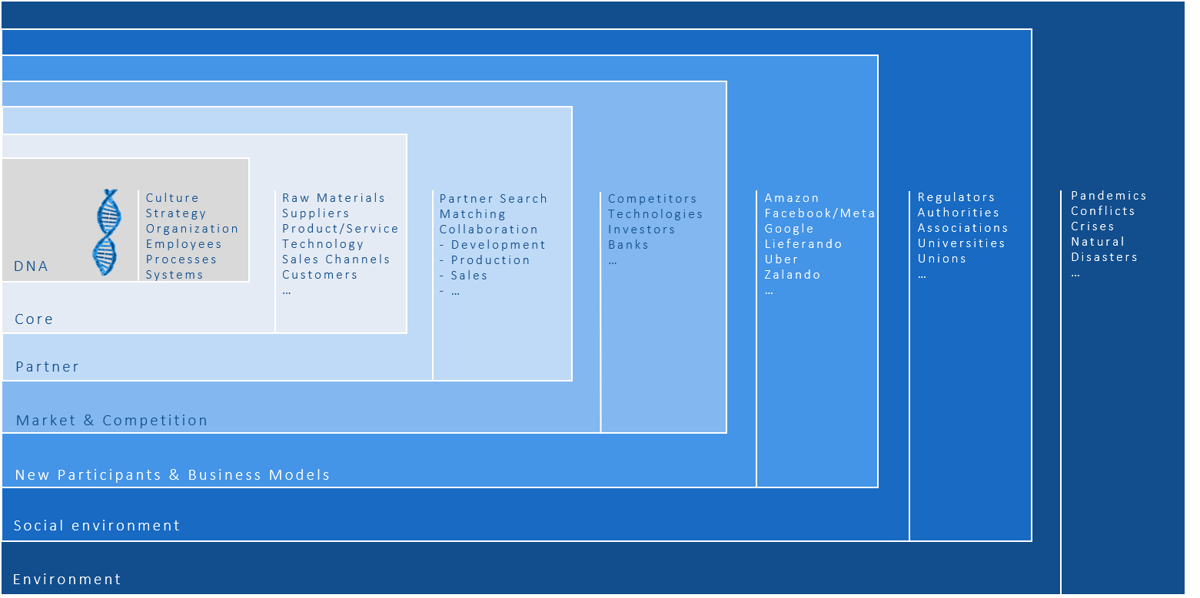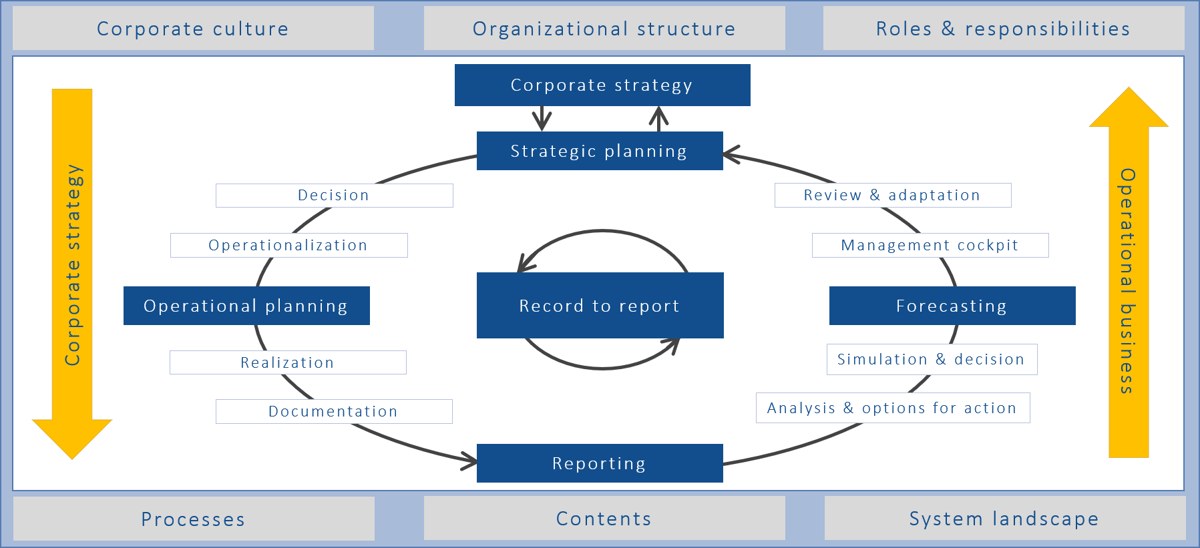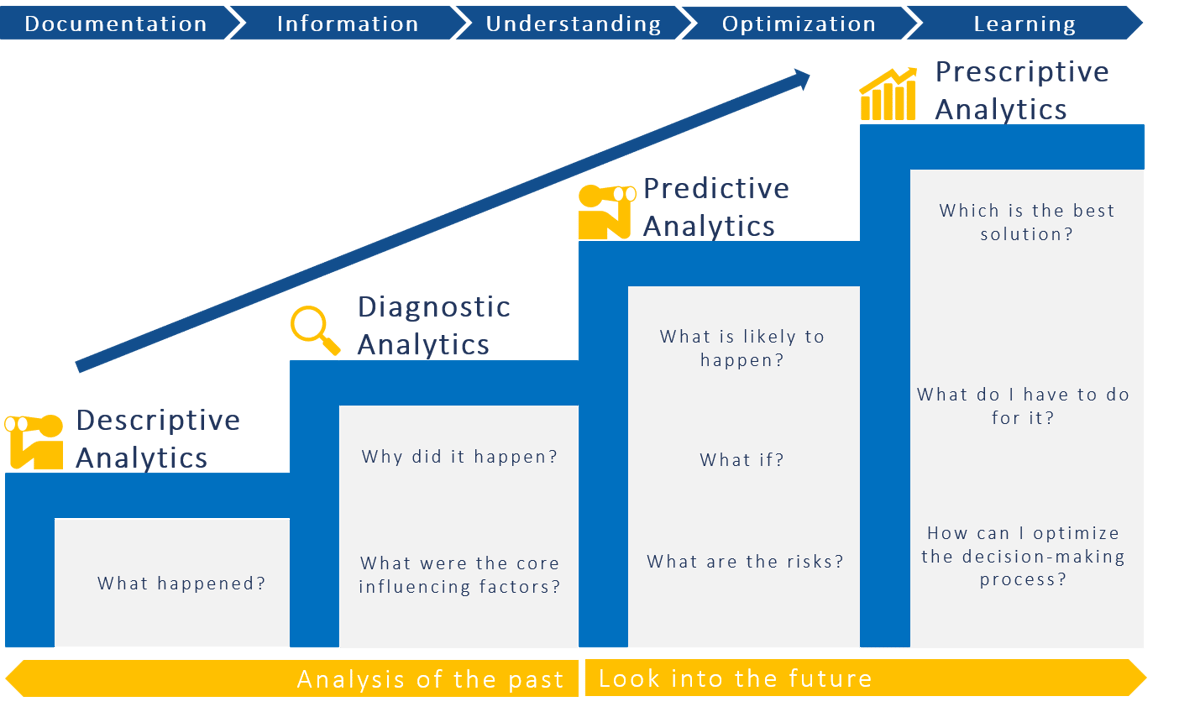Currently, things are anything but easy for companies. Pandemics, war, raw material shortages, disrupted supply chains, high inflation and skyrocketing energy prices make the economic environment extremely challenging. While change has always been a part of (business) life, what is new is the rapid pace of change. To ensure that companies remain successful and competitive in the future, corporate management must adapt to the new circumstances.
Digitization and technological change represent an opportunity to better cope with current and future challenges, to manage the complexity of the framework conditions, and thus to respond more quickly and flexibly. Various factors can be identified that significantly increase the effectiveness of corporate management.
Learn more about the success factors of corporate management
Success factor 1: Self-image as an ecosystem
Companies must realize that they are part of an ecosystem and are subject to mutual dependencies. It is important to continuously monitor the market, competitors, new participants and business models, the social context, and the environment in order to identify potential effects on one’s own business as early as possible.

Companies today are embedded in complex ecosystems.
In the future, the path of cooperation will be much more effective than the path of confrontation. Those who understand the global context and work toward joint growth will benefit in a number of ways. For example, large companies and start-ups could work together more closely to drive innovative ideas forward. The digital platform economy is also opening up new distribution channels and thus new opportunities for companies.
Success factor 2: Uniform understanding of corporate strategy
Corporate strategy plays a crucial role in how companies are managed. The bottom line is that every company pursues the goal of ensuring profitable growth. But the paths that lead to this goal can vary. To penetrate new markets, companies often adopt a growth strategy that focuses on customers, services and products. Cost efficiency and profitability are initially less relevant. In sectors such as the automotive industry and plant engineering, on the other hand, the issues of increasing efficiency and sales, reducing costs and profitability are much more important.
When external circumstances require it, the corporate strategy must be adapted to changing conditions and realigned. The control loop of corporate management acts as a link between the higher strategic level and the operational design of the corporate strategy. Top management defines the framework parameters (sales, employees, profitability, growth). Controlling translates these guidelines into strategic planning, which is then broken down into operational planning at cost center and cost element level.

The control loop of corporate management
The realized operational planning and the corresponding documentation result in a reporting with the plan-actual deviations. On this basis, analyses are carried out and options for action are defined and simulated in order to make the best possible decision for the company. This in turn flows into the forecast and from there into the management cockpit, which discusses whether the measures have brought the desired success and whether an adjustment of the strategic planning is necessary.
Success factor 3: Data as the most important raw material
The selection, availability and quality of data are among the greatest challenges for decision-making. Ultimately, all corporate management and every business decision are based on data; their quality therefore depends to a large extent on the quality of the data on which they are based. Thus, it is a fundamental step for companies to identify and use the data that is relevant to them and transform it into information that serves as the basis for analyses. Finally, the results of the analysis are translated into measures, so that specific options for action for various future scenarios emerge. It is then a matter of deciding on the best option and implementing the measures accordingly.
Success factor 4: Consistent future orientation
Controlling has various tasks when it comes to corporate management: The documentation of a certain data basis results from reporting with figures. These figures must be interpreted and analyzed. What follows is the development of measures to get back on track. Tracking records the effectiveness of the implemented measures. Corresponding forecasts should predict as precisely as possible what will happen when the measures are realized.
As far as the current task weighting is concerned, 72% of controlling activities are retrospective, dealing with the past. This was determined by our current study. Approximately 55% of these activities are dedicated to the determination and provision of numerical material and 17% to the qualitative analysis of this material. To ensure that corporate controlling can continue to contribute to business success in view of the changed framework conditions, the weighting of tasks must be reversed: In the future, 59% of controlling should be dedicated to predictive activities that focus on the future. Innovative technologies such as Robotic Process Automation (RPA), Machine Learning (ML) and Artificial Intelligence (AI) support employees in realizing this consistent future orientation.

From past-oriented to future-oriented corporate management
Success factor 5: Speed of decision-making and action
For lasting success, it is no longer enough for companies to have market power and capital. Rather, the key is to decide and act quickly. This is the only way companies can keep up with the rapid pace of change in today’s economic, technological and political environment.
How can new technologies be used?
Using new technologies makes sense because it speeds up and improves decision-making. For example, RPA can take over repetitive and standardized processes in data-based documentation. Machine learning optimizes the suggestion system by allowing the system to learn whether a decision made was good or bad. The controller and the system interact in terms of a hybrid approach.
The basis is a database with a certain number of recommended actions, including the probability to what extent they are suitable for deviations. The UI now selects the suggestion that has the highest probability of reducing the deviation. The controller accepts this suggestion, selects another suggestion from the database or defines a new recommended action. Afterwards, he evaluates how good the decision was and whether it solved the problem. The system learns from the evaluations of the different actions and is enriched with new proposals. The recommendations rated according to suitability probability are added to the database and can be taken into account for future proposals.
Conclusion: Well positioned for the New Normal
The conditions under which companies operate have changed fundamentally. Corporate management must adapt to the new conditions in order to continue to fulfill its tasks. Certain success factors play an important role in this. If a company regards itself as a component of ecosystems, it is in a position to unlock the potential of increased collaboration with other players in the ecosystem. The corporate strategy must set the direction in which the company should go.
Data is essential for corporate management as a basis for decision-making – but only if it is available in high quality. Companies should focus on what will happen in the future instead of what happened in the past. And speed of decision-making and action will also be essential for corporate success in the future.
![IBacademy_Logo_blau[496] IBacademy_Logo_blau[496]](https://www.ibsolution.com/hs-fs/hubfs/IBacademy_Logo_blau%5B496%5D.jpg?width=200&name=IBacademy_Logo_blau%5B496%5D.jpg)




